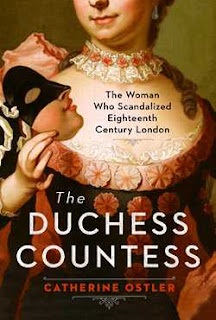Elizabeth’s household wrote to the Duke of Portland to tell him that her health was suffering under the strain. She was “very ill in a fever and inflammation in her bowels wore almost to death with sorrow and fatigue.” She was “seized with a fainting” and had to be carried home from a service at the Chapel Royal in St. James’s in early December, an event Walpole described as a “scream that roused all the palace” and then “ripened to madness.” What he saw as attention-seeking was undoubtedly a resurgence of her anxiety disorder, those faints which overcame her at moments of intense fear. Her hopes of a nolle prosequi (dismissal of the case) looked vanishingly thin. The date was set and discussions about logistics were beginning. How much seating would be needed? And as Elizabeth heard – the Meadowses were only too keen to repeat it – as a suspect could not be tried from a state of freedom, should she be put in the Tower of London?
As she was “confined to her bed by a very severe illness,” her three physicians, doctors Richard Warren, Isaac Schomberg, and Nicholas Faulk, advised she could not possibly appear in court on the set date, and requested the trial be delayed by two months. By now, she was so desperate she took the step everyone had advised her against: she wrote to the king asking him to intercede, making an impassioned, personal plea for his sympathy, reminding him of the vitriol that had pursued his own mother.
What a life! Elizabeth Chudleigh certainly made the best of some less-than-ideal circumstances in her life. It was a different time, and she worked hard for a title and reputation that seemingly meant everything to her.
Official synopsis:
When the glamorous Elizabeth Chudleigh, Duchess of Kingston, Countess of Bristol, went on trial at Westminster Hall for bigamy in April 1776, the story drew more attention in society than the American War of Independence.
A clandestine, candlelit wedding to the young heir to an earldom, a second marriage to a Duke, a lust for diamonds and an electrifying appearance at a masquerade ball in a diaphanous dress: no wonder the trial was a sensation. However, Elizabeth refused to submit to public humiliation and retire quietly. Rather than backing gracefully out of the limelight, she embarked on a Grand Tour of Europe, being welcomed by the Pope and Catherine the Great among others.
As maid of honour to Augusta, Princess of Wales, Elizabeth led her life in the inner circle of the Hanoverian court and her exploits delighted and scandalised the press and the people. She made headlines, and was a constant feature in penny prints and gossip columns. Writers were intrigued by her. Thackeray drew on Elizabeth as inspiration for his calculating, alluring Becky Sharp. But her behaviour, often depicted as attention-seeking and manipulative, hid a more complex tale – that of Elizabeth’s fight to overcome personal tragedy and loss.
Elizabeth Chudleigh was born to a comfortable life, if not an extravagant one. All that could have possibly changed when her father died while she was still a child. She, her brother, and their mother lost the housing that came with his job, and their lives and futures became suddenly much less secure. Elizabeth’s big break came from her placement as a maid of honor to Augusta, Princess of Wales. It was a position for spinsters, but many were married soon as they were presented and entertained at court. Elizabeth, though, made some impetuous choices that left her as a maid of honor for much longer than most of the others in the position.
This story starts out really dry, as it introduces all the characters of the royal family and court. A reader with more interest may have recognized more names and kept them straight, but without existing background, all the details became confusing quickly. Once the facts of the drama were established, it all became entertaining.
The author gives others’ opinions of what mental illness or other condition may have inspired Elizabeth’s over-the-top behaviors, but without an actual live patient to examine, most of these opinions were really just conjecture and labeling. Without having lived in the time period, few of us could say what behaviors were normal or not.
Overall, I’d give this book 3 out of 5 stars and I’m glad I’ve learned more about the early 1700's in England and the surrounding areas. Elizabeth’s potential falls from grace were made more interesting with her blatant denial that she could ever be anything other than a titled lady of means. Those with an interest in biographies of the period would definitely appreciate the author’s detailed descriptions of Elizabeth, those around her, and the lives they led.
{click here to purchase}
Becki Bayley enjoys sweet drinks, salty snacks, and usually some noise in the background. See more of her life on Instagram, where she posts as PoshBecki.
GIVEAWAY:
One of my lucky readers will win a copy of The Duchess Countess!
Enter via the widget below. Giveaway will end on Sunday, March 6th, at 11:59pm EST, and winner will be notified via email the next day, and have 24 hours to respond, or an alternate winner will be chosen.
U.S. residents only, please.
Good luck!
The Duchess Countess: The Woman Who Scandalized Eighteenth Century London, by Catherine Ostler















0 comments:
Post a Comment